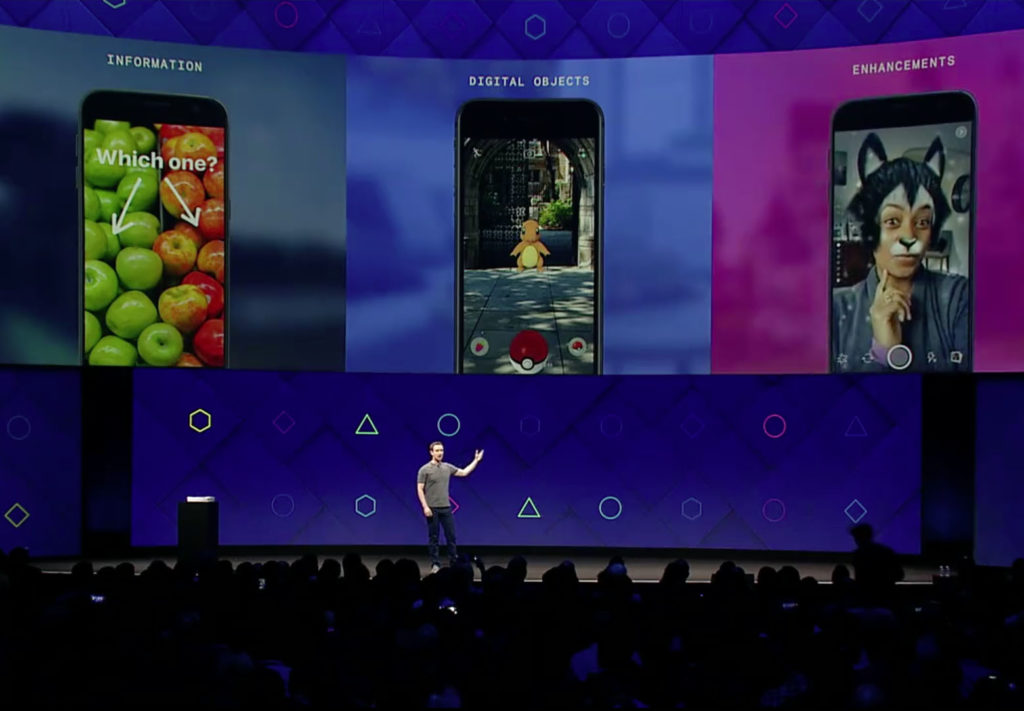Facebook kicked off its annual F8 developer conference on Tuesday, sharing the latest trends and updates that affect brands and users alike.
Say It With AR
“We’re making the camera the first augmented reality platform,” Facebook CEO Mark Zuckerberg announced in the keynote.
Facebook’s new Camera Effects Platform turns smartphone cameras into an open augmented reality (AR) platform, allowing artists and developers to create effects for the Facebook camera. Users will have access to thousands of effects and backgrounds from all over the world, Zuckerberg explained. The Camera Effects Platform launched Tuesday in beta. Early AR Studio beta partners include Electronic Arts’ Mass Effect: Andromeda, GIPHY, Manchester United, Nike, Real Madrid, TripIt and Warner Bros’ Justice League.
Users will immediately notice the similarities to Snapchat features, to which Zuckerberg told critics, “I guess I’m not that worried about that . . . the first chapter that made sense was to release products that people were familiar with . . . but the unique thing that we’re going to do is we’re not just going to build basic cameras, we’re going to build the first mainstream augmented reality platform.”
The open platform is an opportunity for brands to create custom frames and AR effects, but the availability for millions of users to create them could make discovery a bit more difficult. This is where influence marketing may prove ideal for showing off branded AR on Facebook.
“Since AR on mobile is a budding technology that a lot of people are excited about, and there is a high likelihood Apple will soon show AR capabilities on their newest models, Facebook is marching forward on that front,” Stephanie Llamas, vice president of SuperData, said in a statement. “This is a particularly poignant space for them as they continue to make a mark in the mobile space.”
VR Finally Gets Social
One of the major hurdles in VR adoption by consumers has been a lack of social features. While multiplayer is available on a number of games, watching someone else put on the headset isn’t quite as fun as wearing one yourself. When Facebook purchased Oculus in 2014, people wondered what the heck a social network was going to do with virtual reality . . . until now.
Last year at Facebook’s Oculus Connect, Zuckerberg demonstrated a VR conference call which has now been unveiled as Facebook Spaces—a virtual hangout for friends and co-workers to goof off or collaborate on projects. The Oculus app uses Facebook account credentials to access photos, friends and other info you might want to share or create an avatar out of. The app is currently in beta for Oculus Rift and Touch.
For brands and game developers, Facebook Spaces may someday expand to interacting with game worlds or characters, or having a virtual conversation with a customer service rep.
“Transporting to new worlds is something VR users are expressing a significant interest in—be able to do it with friends is even better. Facebook isn’t just allowing people to share social experiences, they are allowing experiences to be social,” Llamas noted.
A Great Time For Game Time
Instant Games are already a big hit for Facebook, who reported that more than 1.5 billion games have been played across Messenger and the Facebook News Feed within the last 90 days. Developers can now customize their own start-and-end screens and integrate new APIs that can help drive share and connected gameplay, Facebook announced.
Gameroom, meanwhile, is Facebook’s new PC desktop gaming platform launching with more than a thousand titles. Designed for games built in HTML5, WebGL or Flash, developers are now able to port games to the Gameroom APK that are built in a variety of engines including Unreal Engine, Cocos2d and more.
A new games tab will help make it easier for players to discover titles on Facebook. Additionally, developers will be able to leverage game bots to create engaging ways for players to connect to their games through actions they take directly within a Messenger chat.
“We are also in the early stages of rolling out the new Games Feed in Gameroom that offers players a continuously updating list of stories that are 100 percent focused on games-related content,” Facebook noted on its blog. “We want to improve discovery for game developers by helping people find out about different games they may enjoy, featuring studio-created posts, videos like producers’ chats and general games news.”
Bots Join The Conversation
Say a group of Facebook users are chatting with friends over Messenger when one of them mentions dinner. M, Facebook’s virtual assistant, may now appear in the style of Microsoft’s “Clippy”—suggesting a restaurant and allowing everyone to make an order directly from the app. Chat extensions will allow users to contextually invite bots into a group chat for other functions, including listening to music and playing games.
For brands who have or plan on developing a chatbot, a new Discover feature allows users to browse and find them easier within Messenger. Consumers can engage with a specific bot by scanning a special QR code. In addition, businesses can generate multiple QR codes for their bots and see which ones are being scanned the most.
Facebook says 1.2 billion people use Messenger every month and “tens of thousands” of developers are building chatbots on the platform. The latest updates are telling of a desire to make Messenger the only app people need. A recent study by Aspect found that 70 percent of millennials “feel good” about chatbots. In addition, 54 percent prefer all customer interactions via electronic means and 49 percent feel that texting is the most effective communication for customer service.

